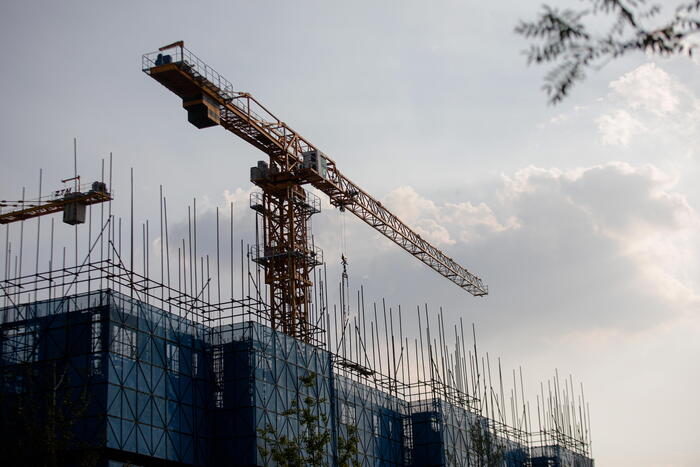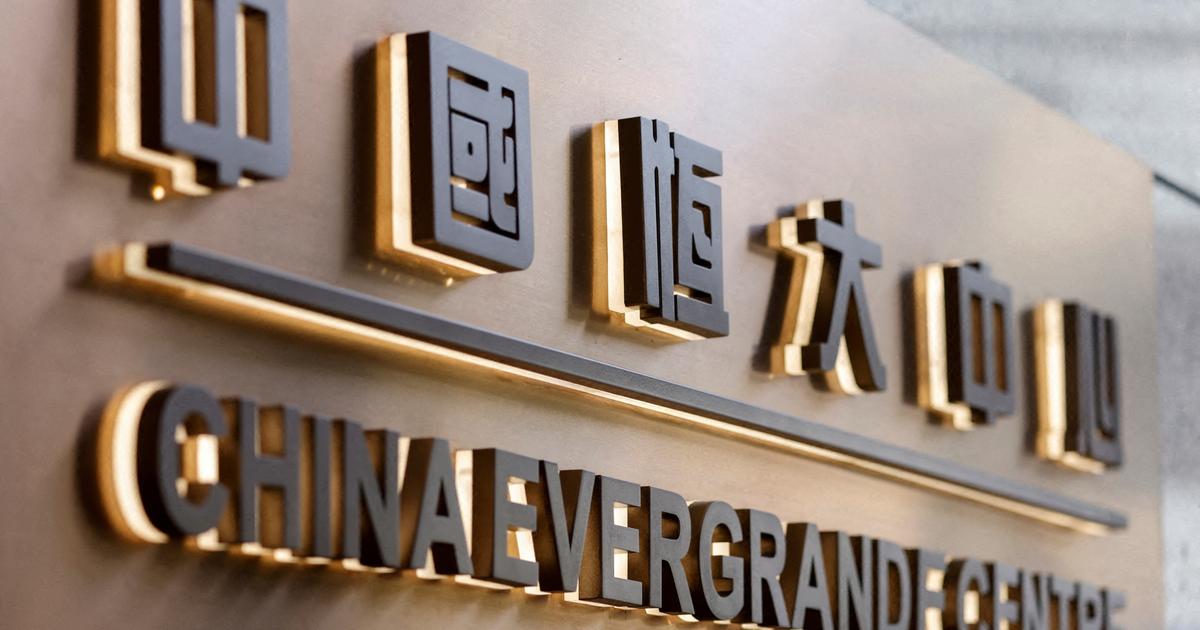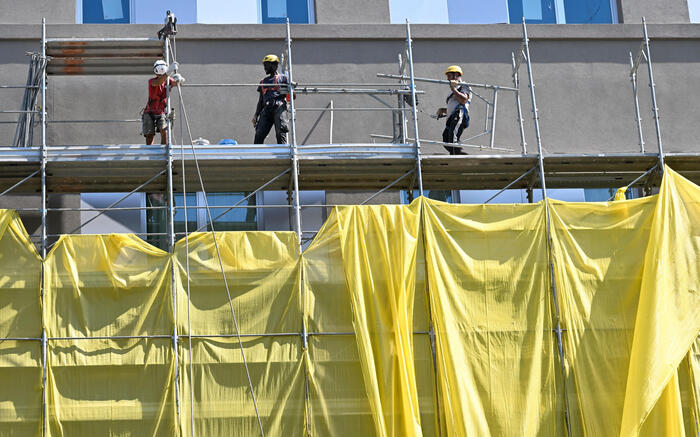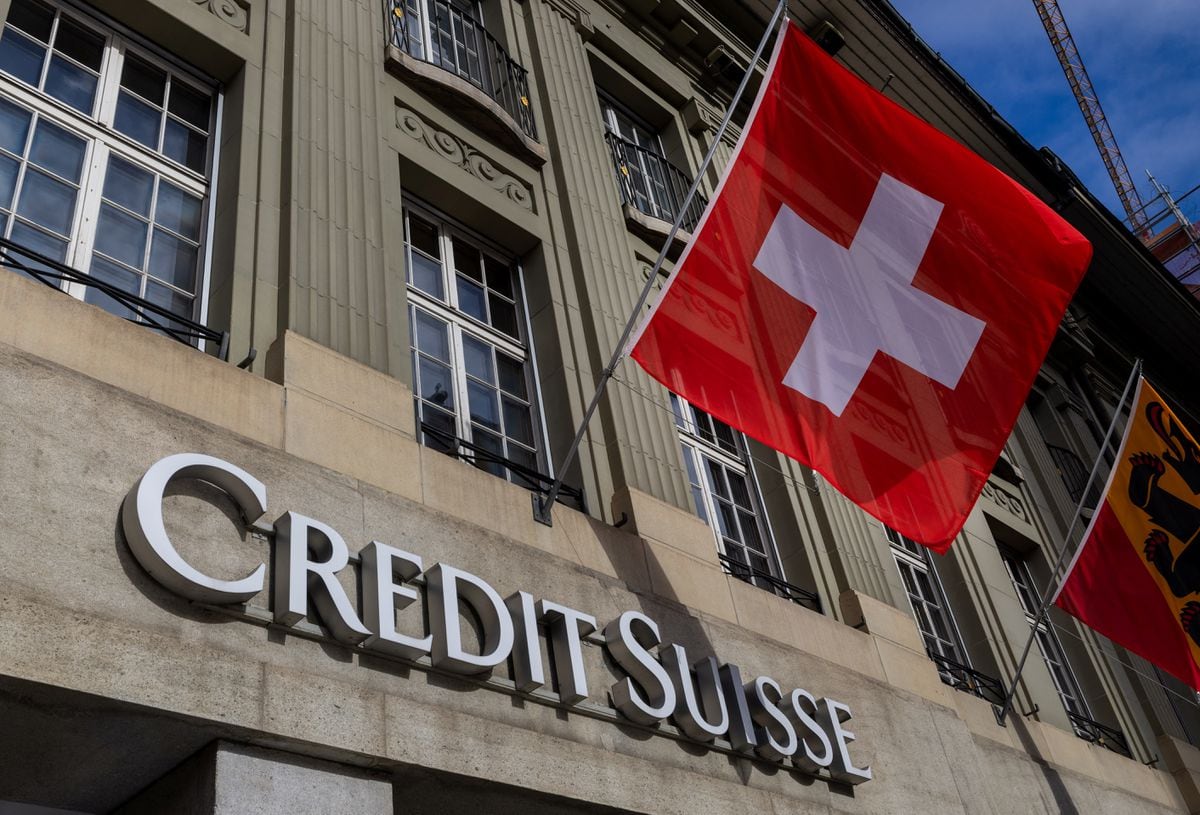Enlarge image
In lofty heights:
If the Chinese real estate giant Evergrande goes bankrupt, international investors can fall deep and lose a lot of money - so far they have remained silent
Photo: ALEX PLAVEVSKI / EPA
How great is the danger that China's wavering real estate developer Evergrande poses to the global economy?
International banks and private investors have lent the group around 23.7 billion dollars - which they want to have interest paid back.
So if Evergrande collapses, the company will drag others along too.
Recently, media such as the "New York Times" reported all-clear signals, but the experienced credit analyst Marco Metzler holds against it.
manager magazin: Mr. Metzler, with your most recent analysis you are essentially claiming that Evergrande has long been bankrupt. Why do you think that?
Marco Metzler: The
fact is that Evergrande and Citibank, as trustee and paying agent for the interest payments, have so far not officially confirmed a single payment of the interest that is overdue for more than 30 days.
The source cited by the New York Times and other media outlets is a single, allegedly anonymous creditor who reportedly reported to the media a few hours before the deadline that he had received the interest payment.
What do you conclude from this?
The fact that receipt of payment has not been confirmed by any official source and that the sources are treated in such a non-transparent manner is a cause for concern.
There remain considerable doubts as to whether the money really and, if at all, only flowed to individual creditors of the offshore bond.
Here Evergrande apparently repeats the same game as it did on October 23rd.
What do you mean by that?
Evergrande and Citibank have not officially confirmed alleged interest payments of $ 83 million at this point.
We asked numerous well-known investors, they could not confirm any receipt of payment.
From our point of view, the Evergrande bankruptcy has obviously already actually occurred.
This also means that all of the other 22 bonds issued are deemed to have defaulted on the basis of the cross-default principle.
This is how it is regulated in the bond terms and conditions.
This means that cheated investors can now file for bankruptcy.
The fact is, Evergrande has not yet been declared bankrupt. How much is at stake for foreign investors?
In fact, according to official figures, Evergrande owes 90 percent of its loans and payments to Chinese creditors. But this is by no means a purely Chinese problem. According to our latest information, international investors alone put around $ 23.7 billion into 23 bonds and three major loans. Fitch analysts expect Evergrande to be liquidated in the event of bankruptcy. Much more than 5 percent of their claims are unlikely to be paid out to the creditors. In other words, international investors would have to write off around $ 22.5 billion in an Evergrande bankruptcy.
22.5 billion dollars - distributed among hundreds of foreign creditors - that sounds manageable and not like an impending "meltdown of the global financial system", as you write in your study.
Focused only on Evergrande and these creditors, the risk may seem manageable. But if you follow the calculations of the well-known Chinese business magazine "Caixin", Evergrande will have to raise a total of around 123 billion dollars for interest and repayments within the next twelve months. Overall, the foreign loans of international investors in China amount to 586 billion dollars, of which around 30 billion dollars were already in default in 2020. If the Chinese state does not step in, we must already see a bankruptcy of Evergrande as certain. In addition, we must not look at Evergrande in isolation: the completely overheated real estate sector represents up to 30 percent of China's economic output. Here, every major bankruptcy can other Chinese real estate companies,Draw banks and insurers into the depths.
What are the consequences for abroad?
With probably considerable consequences.
According to Goldman Sachs, the foreign debt of Chinese real estate developers alone is around $ 197 billion.
The major international bank HSBC, for example, has loans totaling 19.6 billion US dollars for the third quarter, which it has granted exclusively to Chinese real estate groups.
In total, HSBC has granted $ 196 billion in loans to Chinese companies in all kinds of industries.
In addition, international banks with strong Asian business sometimes grant wealthy Chinese credit, which in turn are secured with Chinese debt instruments.
These loans could then also default.
You may not even see this aspect at the moment.
Aren't you painting a little too black here?
The real estate industry is not the only problem facing the Chinese economy, which has recently cooled significantly - the only keywords here are scarce raw materials, supply bottlenecks, massive power outages, plant and port closures and, most recently, food rationing.
A possible bankruptcy wave triggered by Evergrande will further slow down Chinese growth.
At the same time, we see high levels of government, corporate and private debt - China's debt ratio is already 230 percent of annual economic output.
If the supply chains come under further pressure or even break, this also has an immediate impact on the USA and Europe.
The problem of supply chains and supply bottlenecks is currently much debated. What is the significance of Evergrande in this context?
More than two-thirds of Evergrande's debt, we believe, is ultimately owed by other distressed real estate developers and companies in the supply chain.
Evergrande bankruptcy could result in the insolvency of its direct and indirect suppliers.
Most of them are small and medium-sized businesses that rely on large accounts, not only for their businesses, but also for access to finance ...
... that Evergrande provides for these companies?
Yes, Evergrande often gives them these in the form of loans. These financial risks are compounded by the nature of the supply chains. A key feature is the non-substitutability. Unlike in the financial sector, where companies can easily switch to other products, there are no simple substitutes in a complex supply chain, especially not in the short term. A collapse of the construction company will in all likelihood result in a large group of suppliers not only losing their business, but also falling into immediate financial hardship, which can result in a chain of bankruptcies.
Do you believe that Evergrande can manage to defuse its precarious situation by selling assets abroad and, with the help of Beijing, to contain the even bigger fire in China itself?
I think S&P Global Ratings summed it up nicely in one of their reports. A government bailout would undermine the campaign for greater financial discipline in the real estate sector that the state recently launched. And even if China did step in, it would have no impact on foreign investors, as Evergrande is officially registered in the Cayman Islands. Under the May 14th Law on "Mutual Recognition and Assistance in Bankruptcy Proceedings," the Chinese state would not pay foreign investors' debts in such a case.
The DMSA, for whom you work as a consultant, defines its goal as follows: "To create more transparency for consumers in the selection of products, investments and services." Those should only count as Evergrande investors in exceptional cases. So why this alarmist tone of the study, is DMSA itself invested in Evergrande?
We believe that the dangers posed by the Chinese real estate sector not only for China are criminally underestimated.
And yes, we have even a comparatively small amount of $ 50,000 invested in Evergrande bonds.
For us, this is not a speculative investment, but a means to an end.
Should Evergrande fail to make the next overdue interest payments on further bonds by the November 11th cut-off date, we as creditors will file for bankruptcy against the company.
That is not banal, very time-consuming, but it is basically possible.
Much heavier investors could have done that long ago. You really believe that the - with all due respect - insignificant creditor DMSA from Germany can initiate the insolvency proceedings against the real estate giant Evergrande?
We are concerned with the principle and transparency. In our view, big corporations can't just pile up a ton of debt and then not pay it back the next moment. Evergrande and Citibank as the paying agent are also completely non-transparent in this process. With the purchase of the bond and a possible bankruptcy filing, we want to provide public clarity as to whether Evergrande can still fully service its bonds in the future or whether it is bankrupt now. We are in a fairly comfortable position because there is a lot at stake with the other investors. If Evergrande goes bankrupt, they lose more than these interest payments. So, in my opinion, they keep quiet. There are also market rumors that some investors and banks deliberately do not inform about the failure of the interest payment,to buy time to sell larger holdings of Evergrande bonds and stocks to ignorant investors via derivatives.















